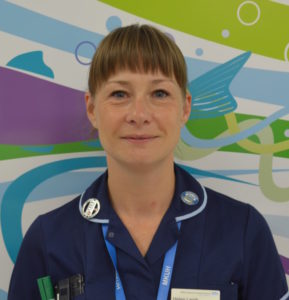Last Modified: 3:24pm 14/08/2023
Ward 4
Our paediatric doctors accept the referrals onto PAU. The unit is open 24 hours a day, seven days a week.
On arrival at the PAU your child will be assessed by a paediatric nurse, who will take a history from you and your child. They will carry out some simple tests (observations) on your child.
You will then be shown to a waiting area. The paediatric doctors will see you as soon as is possible. Please note we might not see patients in the order in which they arrive. We hope you will understand that this is because we prioritise seeing the children who are most in need first. Nurses will always keep you up-to-date on the length of time you are likely to wait.
If you require a bed for your child while you are waiting to see a doctor please let a member of staff know and we will try to help.
Once your child has been assessed by a doctor you will be given a plan which may include observation on the unit, discharge home or transfer to Ward 5.
Your child may have tests such as blood tests, an x-ray, or samples taken of their urine or stool. The tests they have will depend on your child’s needs. Any tests or investigations will be discused with you and explained thoroughly.
If your child or baby is hungry or thirsty whilst they are on the ward, please ask a member of staff for any supplies required.
There is also a ‘hydration station’ for parents and relatives to use to make tea or coffee. A small donation is requested to support the continuation of the service.
If you have any questions or queries whilst on the unit please do not hesitate to ask a member of staff.
When your child is ready to go home, you will be given a patient information leaflet and any other information relevant to your child’s condition and/or treatment. You will also be provided with a discharge letter which will explain why your child has been in hospital, the tests we have done and any medications we have given. Your GP will also be sent a copy of this letter. Please get in touch with your GP if you have any further questions or appointments after you have left hospital.
Senior Sister

Helen Leigh has worked at the hospital since April 2000, and has been the Senior Sister for Ward 4 since November 2015. Helen is available Monday to Friday 8am until 4pm. Her office is situated on Ward 5. Helen is happy to be contacted on 01908 996 368 or via email [email protected]
Join as a member of MKUH
Signing up to membership of Milton Keynes University Hospital is free, and benefits include NHS discount; email newsletters; opportunities to attend membership events and participate in service improvement initiatives and surveys; and voting for your local hospital Governor and even standing as a Governor in elections. It takes 60 seconds to sign up, which you can do by clicking here.
Also known as
Ward manager
Matron
Contact Number
Location
Car Park
Visiting hours
Additional Information
Ward round
0930 – 1030
Meal times
- Lunch 1200 – 1300
- Dinner 1700 – 1800
If you would like a snack, please ask a member of staff.
For more visitor information, including restaurants, shops, and car parking, click here.
MKUH has partnered with AccessAble in order to provide a detailed access guide for the public. This guide lets you know what access will be available when you visit our hospital and services. In order to find out more about the route you will use for Ward 4 please follow this link: https://www.accessable.co.uk
Staff
Ear, Nose and Throat
Maternity
Neonatal Unit
- Safeguarding Children and Young People (0-18 years)
- Prolonged Jaundice in Babies
- Red Box Patient System
Paediatric Diabetes
Paediatrics
- Chest infection/pneumonia
- Paediatric Patient Initiated Follow Up appointment
- Paediatric Bereavement Booklet
- Home Leave Agreement
- Traction: principles and application
- Laparoscopy: Going Home After
- How to Administer Buccolam®
- Appendicitis and Your Child
- Urine Sample
- Your Child’s Outpatient Appointment
- Urinary Tract Infections (Complications and Tests)
- Fasting – All You Need to Know (A Guide for Parents/Carers)
- Skin Prick Testing
- Food Challenges
- Whooping Cough (Pertussis)
- Viral Induced Wheeze
- Urinary Tract Infections
- Treatment of Hypoglycaemia (Hypo’s) For Insulin Pump Users
- Treatment of High Blood Glucose Levels (Hyperglycaemia) on Pump Therapy
- Preventing Diarrhoea and Vomiting in Children 0-5 years
- Rectal Paraldehyde For Stopping Seizures
- My Child is Having Sedation: Advice for Parents
- Home Intravenous (IV) Antibiotic Teaching Pack for Children / Parents / Carers of Children with Cystic Fibrosis (CF)
- High Blood Glucose Levels (Hyperglycaemia) On Pump Therapy
- Head Injury – Discharge Information for Parents / Carers (Paediatrics)
- Head Injury Advice Sheet for Children
- Fever Advice Sheet for Children 0-5 years
- Egg allergy and Mumps, Measles and Rubella (MMR) Vaccination in Children
- Cystic Fibrosis Information for Families
- Children and young people with constipation – Advice sheet for parents and carers
- Children’s Community Nursing Service
- Bronchiolitis Advice Sheet
- Basal Rate Testing for Insulin Pump Users
- Haemolytic Disease of the Newborn (HDN)
- Pregnancy testing before an operation, investigation or treatment
- A Leaflet for Young People: Safeguarding (16-18 Years)
- Young People’s Guide
- Recurrent Abdominal Pain
- Pain Assessment (A Guide for Parents / Carers)
- Central Venous Catheters: A Guide for Parents and Carers
- Patient Controlled Analgesia (PCA) – A guide for Older Children (8-16yrs)
- Childhood obesity
- Paediatric Pre Assessment Booklet
- Safeguarding Children and Young People (0-18 years)
- Nephrotic Syndrome
- Care of Your Mouth after Oral Surgery
- Incision and Curettage
- Protecting your baby from low blood glucose
- Central Line Training for Schools
- Care of a child with a chest infection / pneumonia
- Prolonged Jaundice in Babies
- Child Protection Medical
- Children’s Cancer Services
- Pica (Eating Inedible Objects) and Polydipsia (Drinking Excessively)
- Clobazam for preventing seizures
- Dairy Re-introduction plan – Milk Ladder
- Egg introduction – Egg ladder
- Ethosuximide for preventing seizures
- House dust mite allergy
- Lamotrigine for preventing seizures
- Levetiracetam for preventing seizures
- Midazolam for stopping seizures
- Oral carbamazepine for preventing seizures
- Red Box Patient System
- Paediatric Epilepsy Service
- Sodium valproate for preventing seizures
- SUDEP (Sudden death in epilepsy): What you need to know
- Topiramate for preventing seizures
Respiratory/Chest Medicine

